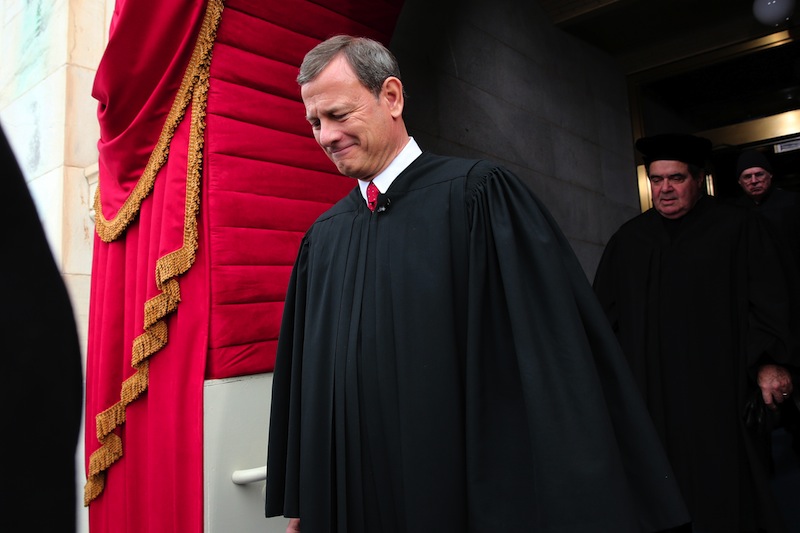In oral arguments Tuesday morning on California’s Proposition 8, the Supreme Court appeared narrowly divided on the question of whether the Constitution’s guarantee of equal protection affords same sex couples the right to marry — but a majority of the justices appeared skeptical that the case has standing and flirted with throwing it out.
Chief Justice John Roberts set the tone by asking each of the lawyers to begin by explaining why the case has standing, as the court had specifically instructed the parties to do.
At least five justices voiced skepticism about whether the case was properly before the court. At issue is whether the case was properly defended. The state of California has declined to defend Prop 8 in court, and so the defense was undertaken by one of the original proponents of the Prop 8 ballot initiative in 2008.
“There’s a substantial question on standing,” said Justice Anthony Kennedy, who is widely seen as the likely swing vote. “I just wonder if this case was properly granted.”
“I suppose there might be people out there with their own personal standing,” said Roberts, suggesting that Prop 8 be defended by someone who is personally injured if it is invalidated.
If the case is thrown out on issues of standing, the likely upshot would be to knock down Prop 8, given lower court decisions, without affecting gay marriage bans in other states.
Justice Stephen Breyer said the group defending Prop 8 was “no more than a group of five people who feel really strongly that we should vindicate this public interest.”
Justice Ruth Bader Ginsburg asked the lawyer arguing against Prop 8 whether the Supreme Court has ever granted standing to a proponent of a ballot initiative. Justice Sonia Sotomayor, referring to the plaintiffs, asked, “how does it create an injury to them?”
Justice Samuel Alito said the California Supreme Court had rightfully authorized the proponents of Prop 8 to defend the law. Justice Antonin Scalia was eager not to throw out the case.
“It’s too late for that now. … We’re granted cert,” he said. “We’ve crossed that river.”
The justices also held a spirited debate on the merits and appeared sharply divided as to whether or not states have the right to outlaw same-sex couples from marrying. Kennedy would likely be the swing vote if the Court rules on the merits of gay marriage bans.
If the justices vacate the 9th Circuit’s decision, which is what is being appealed, the district court decision overturning Prop 8 would still stand, according to the respected SCOTUSblog, meaning same-sex marriage would be legal in California for now. Still, the case could be relitigated by a new party with proper standing.
Justice Clarence Thomas did not speak during the argument, as is customary for him.
The lawyers who argued the case were Charles J. Cooper, who defended Prop 8, Ted Olson, who pushed for striking down Prop 8 and all gay marriage bans in states, and U.S. Solicitor General Donald Verrilli, who also argued against Prop 8. All three lawyers urged the Court to issue a ruling on the merits, arguing that the case had standing.
Alito suggested that same sex marriage should “be left to the people.” He questioned whether the judiciary ought to decide whether or not to validate an issue “of such fundamental importance” which is “newer than cellphones or the Internet.”
The political and legal history of gay marriage in California is torturous. Proposition 8 was passed by California voters in November 2008 in response to a ruling by the state Supreme Court earlier that same year that found a right to gay marriage under the California constitution. Same-sex marriage had previously been banned by statute and by a referendum passed by the voters in 2000. Following the passage of Prop 8, the California Supreme Court ruled in 2009 that it was valid, but left intact and legal the gay marriages that had been legally performed before Prop 8 passed. Challenges to Prop 8 were filed in federal court and eventually made their way to the Supreme Court, but not before an exceptional amount of legal wrangling and further involvement by the California Supreme Court.
The chart below details where each state stands on marriage equality.

Correction: Arnold Schwarzenegger was governor when California originally declined to defend Prop 8 in court. Due to an editing error, this post originally suggested that it was Jerry Brown. We regret the error.






